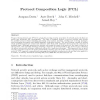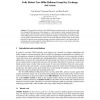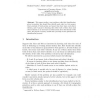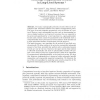1612 search results - page 16 / 323 » About models of security protocols |
ENTCS
2007
13 years 7 months ago
2007
Protocol Composition Logic (PCL) is a logic for proving security properties of network protocols that use public and symmetric key cryptography. The logic is designed around a pro...
CANS
2009
Springer
13 years 11 months ago
2009
Springer
We extend the well-known Tree-Diffie-Hellman technique used for the design of group key exchange (GKE) protocols with robustness, i.e. with resistance to faults resulting from poss...
EUROCRYPT
2007
Springer
14 years 1 months ago
2007
Springer
We study an adaptive variant of oblivious transfer in which a sender has N messages, of which a receiver can adaptively choose to receive k one-after-the-other, in such a way that ...
CTRSA
2006
Springer
13 years 11 months ago
2006
Springer
This paper studies a new problem called fair identification: given two parties, how should they identify each other in a fair manner. More precisely, if both parties are honest the...
CONCUR
2008
Springer
13 years 9 months ago
2008
Springer
Abstract. For many cryptographic protocols, security relies on the assumption that adversarial entities have limited computational power. This type of security degrades progressive...




